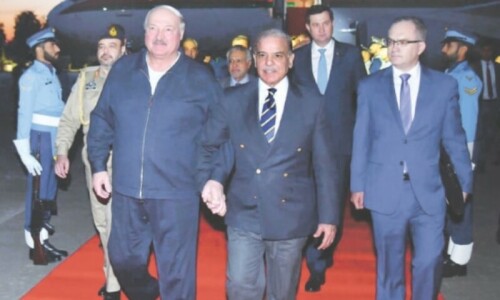 KATHMANDU, July 21: Lawmakers in Nepal voted in the Himalayan nation’s first post-royal president on Monday, but their rejection of a candidate backed by the Maoists was likely to lead to more political deadlock.
KATHMANDU, July 21: Lawmakers in Nepal voted in the Himalayan nation’s first post-royal president on Monday, but their rejection of a candidate backed by the Maoists was likely to lead to more political deadlock.
Ram Baran Yadav, who was supported by the centrist Nepali Congress party, won 308 out of 590 votes cast in Nepal’s constitutional assembly in a run-off between him and Maoist-backed rival Ramraja Prasad Singh.
The selection of a president has been seen as a vital step to ending weeks of political impasse after the assembly ousted unpopular king Gyanendra and abolished the 240-year-old monarchy in May.
But the result showed other parties in the assembly ganging up against the Maoists -- who won the largest single block of seats in elections to the new assembly earlier this year but not an outright majority.
Yadav, a former health minister and trained medical doctor, told AFP he would use his new position to try to unite Nepal and address grievances among the country’s ethnic communities.
“The immediate need of the nation is to address the lack of a fair political culture,” said the 61-year-old Yadav, a son of a farmer.
“I want all Nepalese to join hands in harmony and move ahead in the development of the country.” The Nepali Congress party said the outcome of the vote showed how democratic the country’s new political system was.
“We are very happy that a common man’s son has become the first president of the republic of Nepal. Yadav is not of the Nepali Congress, but of all the people of Nepal,” said the party’s general secretary, Bimalendra Nidhi.
“This result is a process of democratic multi-party politics. The country used to be divided into left and others, but this alliance is truly democratic because all forces have joined hands together.” The presidency is a largely ceremonial position, but Yadav’s victory could delay efforts by the Maoists to form Nepal’s first republican government.
Even if the Maoists succeed in forming an administration, they may find themselves with little chance of implementing key platform pledges like land reform and will face constant risk of being toppled by rivals.
Maoist spokesman Krishna Mahara said his party was now considering its next move following the political blow.
“We haven’t decided how the Maoist party is going to go ahead,” Mahara said. “We might not go to form the government, but we haven’t decided yet.” The Maoists’ continued involvement in mainstream politics is seen as crucial to the survival of Nepal’s peace process, which ended a decade of civil war that left at least 13,000 dead and crippled the already impoverished country.
Political analyst and columnist Prashant Jha said having a president that was not backed by the Maoists would bring new “problems and challenges” of power-sharing.
He said if the Maoists refused to form a government, there would be no political stability in the country, and that writing a new constitution -- the main task of the assembly -- would be “extremely difficult.” “Their recent statements suggest they might prefer to stay outside the government. If they decide to stay as opposition, it will be a tragedy for democracy and the peace process,” Jha said.—AFP












































Dear visitor, the comments section is undergoing an overhaul and will return soon.